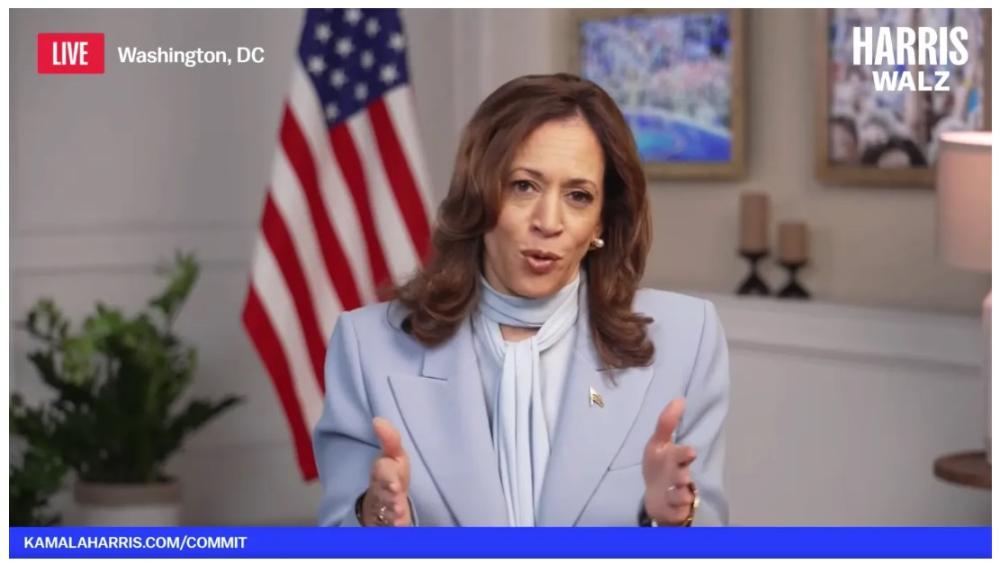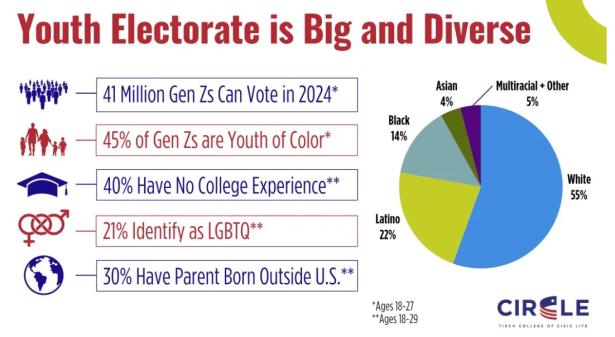National Voter Registration Day Numbers and Observations From a Harris-Walz Youth Organizing Call
The context in which we exist
If you’re reading this newsletter, you likely already understand the power and sheer size of the youth voting bloc. But yesterday the Center for Information & Research on Civic Learning and Engagement at Tufts (CIRCLE) held a 2024 media briefing call, re-emphasizing the facts. Here are a few top-lines to know about this demographic.
This November:
-
41 million Gen Zers are eligible to vote
-
45% of those Gen Zers are youth of color
Looking at all eligible young voters under 30:
-
40% have no college experience
-
21% identify at LGBTQ
-
30% have parents born outside US
Registering those voters
Tuesday was National Voter Registration Day, and according to key voter registration organizations, the number of new voter registrations they saw was quite high.
To start, Vote.org had it’s best-ever NVRD numbers with over 150,000 new registrations.
-
The organization says 81% of new registrations were from voters under 35, and 11% of those new registrations were from people who are 18-years-old.
-
The organization registered more 18-year-olds than any other age group.
-
The number of 18-year-olds who registered on NVRD this year was 53% higher than in 2020.
HeadCount, which works mainly with celebrities and artists to bridge civics and pop culture, received over 23,000 digital registrations on NVRD, the organization tells me.
-
Prior to NVRD - from 11/8/22 to 9/16/24 -- the organization had registered 244,584 total. I’m told that as of today, the organization has reached 250,000 registrations for this cycle.
And youth voter engagement organization NextGen America has registered 37, 379 voters since the school year started.
-
That's 50% more voter registrations than the August-mid September timeline in 2020.
I’m often asked about pop-culture this election cycle and whether or not celebrities, artists, and influencers could really mobilize young voters. From my point of view, these public figures (and more niche influencers/content creators, too) can certainly drum up excitement about voting and help get young people to the ballot box, but they likely won’t sway who someone will vote for.
That said, given HeadCount’s focus on the nexus of civics and pop-culture, I asked the organization’s executive director Lucille Wenegieme for her take. She said the organization is “witnessing an unprecedented level of engagement among young voters.”
Here’s more of what she had to say (edited lightly for brevity):
What stands out this election cycle when it comes to excitement from young voters and an eagerness to register to vote?
LW: “The issues at stake—climate change, social justice, and economic opportunity—are deeply resonating with them. Many young people are recognizing the power of their vote to influence the future, and there’s a palpable excitement to be part of that change. Initiatives like our voter registration drives are seeing more participation than ever, showing that young people are not just ready to register, but eager to make their voices heard.”
“One difference this year from previous cycles is the obvious pent-up enthusiasm among young people. We’re seeing an enormous surge of registrations and engagement arrive later than it has in previous cycles, where there’s been more of a steady incline as we get closer to the election.”
How, if at all, do you think pop culture is playing into that? What is the role of celebrities or artists in helping to drive that energy?
LW: “Pop culture plays a crucial role in mobilizing young voters. Being civically engaged can sometimes feel like ‘eating your vegetables’ to young people who are politically disengaged. Parents and elders are consistently preaching its importance. But when ‘it girls’ or influencers also promote the importance of voting and civic engagement to their young audiences, it cuts through that perception. Especially with the growth of social media celebrities, artists and influencers have these huge platforms and can reach audiences in so many ways. When people with their level of influence advocate for voting, it normalizes the conversation and makes civic engagement feel accessible and urgent — even cool.”
“On National Voter Registration Day alone, we had over 100 celebrities post stories and saw an increase in the number of registrations driven from these digital campaigns. Their impact is substantial and creates a ripple effect that inspires more young people to get involved.”
Any specific events or initiatives HeadCount has between now and Election Day?
LW: “In addition to all of our work in the field at concerts and festivals, we’re really excited about our ‘Good to Vote’ campaigns, which offer fans once in a lifetime experiences and prizes with a wide variety of artists, brands and celebrities. Fans can enter to win by simply checking their voter registration status.”
The campaigns Wenegieme cited include: “2 VIP tickets to see Sabrina Carpenter at her San Francisco show,” “Broadway Trip of A Lifetime that includes airfare, hotel and the 2 tickets to 4 Broadway shows of your choice,” “A VIP, all expenses paid trip to attend Austin City Limits with influencer Brittany Broski,” and “a chance to win Jeans for Life from American Eagle.”
A few observations
I’ve spoken with many first time voters this week for an upcoming story I’m working on. It continues to strike me how many tell me that their introduction to politics was in middle school, after the Parkland school shooting at the Marjory Stoneman Douglas High School that left 17 students and faculty dead. That's what opened their eyes to our country's political system. Their politics have been shaped as a result.

This isn’t lost on Vice President Kamala Harris, who joined a Harris-Walz national youth organizing call on Wednesday as part of the campaign’s youth vote week of action (during which I’m told there will be a total of 160 youth focused events across the country). As part of her remarks, Harris told those on the call she understands this generation’s perspective on issues like gun violence, climate change, and reproductive rights.
“When I meet with young leaders across our country, it is clear to me that your generation, with your unique lived experiences, understands what is at stake for your future and for the future of our country,” Harris said.
The vice president also emphasized the trademark sense of urgency with which many in Gen Z (on all sides of the spectrum) describe their view of politics.
"You are impatient in every incredible, good way. You're not waiting for someone else to step up and lead. You are saying you're gonna step up and get it done,” she said.
Harris often says she loves Gen Z. Her line about young people’s impatience in particular showed me she has spent time listening to their concerns and understands the way their brains operate, especially when it comes to politics.
Here are a few of my other takeaways from the call, and from this week’s Harris-Walz youth events in general:
-
The fact that Harris joined and spoke on the call (even if for just a few minutes) signals the campaign is taking this bloc seriously. She referenced conversations with young people including on Tuesday in Philadelphia.
-
The campaign is clearly uplifting and utilizing younger surrogates like Tennessee state Rep. Justin Pearson, who has become a leader young Dems (and young people in general) can look up to. He's been outspoken on issues like gun violence and democracy.
-
They are capitalizing on star power to reach young people, like actress Chloe Grace Moretz (who mentioned the economy and Harris' plans for the middle class as an issue to talk to friends and peers about).
-
At the end of her remarks, Harris emphasized a desire for community building around her campaign. "Let's also be intentional on building community. Let's be intentional on building coalitions,” she said. This could be a powerful message to a group of young organizers.
-
The call was led by Eve Levenson, who's 24 and the the campaign's national youth engagement director. Levenson’s been in the youth organizing space since she was a teen and is key to the campaign’s youth vote strategy. The fact that they have a 24-year-old at the forefront of this work is important, and strategic.
-
While Harris herself (and Moretz) mentioned issues they know are at stake for young people, she did not go into detail about her concrete plans or solutions to tackle them. As mentioned last week, I’m hearing from young people (including both organizers who are gung-ho for Harris and undecided voters) that they want to hear more details from Harris. In the coming weeks, I wonder how and if she will start to scratch that itch for young people.
On the second apparent attempted assassination of former President Donald Trump…
Sunday marked the second apparent attempted assassination of Former President Donald Trump — the second in two months. I noticed there had been much less talk about it this time than the last and asked for young people’s thoughts as to why that was. One friend told me they recognized how awful the political violence is, but that they almost felt “numb” to news like this. They mentioned rising political violence around the world. Here’s some more of what the young voters I heard from had to say:
-
“More attention draws attention to the rhetoric. Vitriol is the fuel this cycle.”
-
“Because the secret service did their job.”
Thank you for reading The Up and Up! Please feel free to share it.
[Rachel Janfaza is a journalist covering young Americans and our politics and a consultant focused on youth civic engagement.
"Fixated on the intersection of politics, journalism, and education, I’m currently working on a few different initiatives geared at bringing more young Americans into the civic and political fold."
Most recently, I started 'The Up and Up,' a newsletter focused on Gen Z’s political zeitgeist: how young Americans are organizing, mobilizing and participating in civic life and politics – or, how and why they’re not. I also freelance, with bylines in the New York Times, Vogue, POLITICO Magazine, Vanity Fair, Teen Vogue, Glamour, Elle, Cosmopolitan and Bustle.
Previously, I was an associate writer on the CNN Politics team covering young voters, campaigns and breaking news. As the first writer for CNN Politics dedicated to the youth beat, I wrote about the first members of Gen Z to launch campaigns for Congress, how TikTok became a political battleground and the youth mental health crisis following the Covid-19 pandemic.]


Spread the word